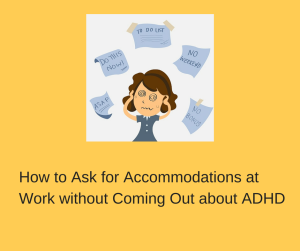The workplace has become a very challenging place, even for neurotypicals. Maybe it’s always been this way, but with the speed that things happen today, increased expectations from bosses and clients and worldwide competition for your job, it certainly seems more stressful than ever. If you have adult ADHD, you add a big bunch of extra challenges to the mix:
• Inattentiveness and lack of focus can lead to missed details, and make it challenging to accomplish work that requires concentration at the best of times,
• Forgetfulness has very likely already led to more than one missed commitment and the resulting loss of credibility,
• Disorganization has you feeling overwhelmed, distracted and jumping from one task to another,
• Procrastination leads to last-minute, gun-to-the-head, high-stress production to meet deadlines, causing you great stress,
• Or you play the hero, pitching in to put out other people’s fires while your own work goes undone,
• and more.
These extra challenges make the workplace a veritable minefield of reprimands and disappointments, but what can you do about it?
The obvious answer, and the one most experts provide, is that “You should ask for accommodations at work.” That sounds simple, doesn’t it? Accommodations have been proven to help, and it’s likely they would help you, but there’s a little problem. How can you ask for and get accommodations unless you disclose your ADHD at work? And as we know, there are risks associated with that.
So what can you do? There are ways of asking for accommodations without disclosing your ADHD.
If you don’t feel it’s safe to disclose your ADHD at work, or if you’d just rather not, you’ll be happy to hear there’s a “formula” that will help you to ask for “accommodations” without outing yourself. Use this model “script” to write down what you’d like to say, adapted to your specific circumstances, practice and use again and again with success:
Step 1. Describe your specific struggle and the circumstances surrounding it.
Step 2. Describe a possible solution you’ve thought of.
Step 3. Describe the benefits your boss, your co-workers and you will get from implementing this solution. WIIFY & M (What’s in it for you and me.)
For example, if there’s too much noise in your cubicle farm and you feel you’d be able do a better job preparing a particularly challenging report that you need to do regularly if you had a quiet place to do your work, you would apply the three steps as follows:
Step 1. Describe your specific struggle: Say something like, “I really struggle to stay focused on the XYZ reports because of all the noise in office.”
Step 2. Describe a possible solution: “I’ve thought of one possible solution: when I work on these reports, would it be possible for me to use a closed office, conference room, or to work from home?”
Step 3. Describe the benefits: “This will help me get it done much faster, so Joe can get started on his part sooner, and I’ll complete it with fewer or no mistakes so it’ll reduce the time you spend double-checking everything.”
You’ve done a good job of selling the solution by pointing out the benefits to all, it doesn’t sound like you’re whining… and no one mentioned ADHD!
So the formula is:
Specific struggle / Circumstances + Solution (aka Accommodation) + What’s in it for all?
“Job accommodation means modifying a job, job site, or the way in which a job is done so that the person with a disability can have equal access to all aspects of work.” (1)
Job accommodations may also include the use of tools such as headsets, assistive technology, training, job restructuring, job reassignments or even an administrative assistant.
One of my clients, an administrative assistant, had to review all of her supervisors’ direct reports’ expense reports once a week. This was tedious work that required a lot of focus and some quiet uninterrupted time. The challenge she faced was that she was expected to answer the phone at the same time, which led to numerous mistakes. Here’s the script she used:
Step 1. “I’m really struggling with reviewing your direct reports’ expenses. The challenge is that each time I answer the phone, I lose track of where I was before the call. This leads to missing details or making mistakes.”
Step 2. “I know that I need two or three hours of uninterrupted time when I am most focused to ensure I don’t make these mistakes. I’ve found a possible solution: Could Carol take my phone calls on Tuesday mornings so that I can do the work uninterrupted?”
Step 3. “With this solution in place, I’ll be able to dramatically reduce mistakes and make sure all the receipts are there and accounted for. This will prevent you from getting calls from the Accounting Department or the company paying out more than allowed by receipts. With fewer interruptions, I may even be able to get it done faster.”
Her supervisor thought it was an excellent idea and allowed the phone call transfers so my client was able to complete this work without mistakes. And they all lived happily ever after!
(1) Source from http://www.workwithoutlimits.org/
“By Linda Walker. Linda Walker, PCC, B. Admin., is a certified ADHD Coach who helps adults with ADHD overcome the special challenges of Attention Deficit Disorder (ADHD) they encounter at home and in the workplace. She is the creator of The Maximum Productivity Makeover for Creative Geniuses, a training program for adults with ADHD and the author of With Time to Spare. http://www.CoachLindaWalker.com.”
How to Ask for Accommodations at Work Without Coming Out about ADHD
“Image courtesy of jesadaphorn/FreeDigitalPhoto.net)
Follow ADHD – ADD’s board ADHD and the Workplace on Pinterest.


